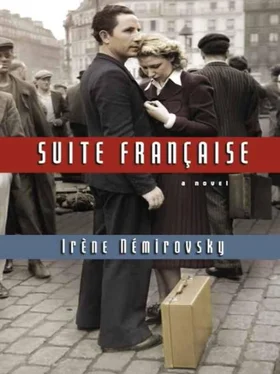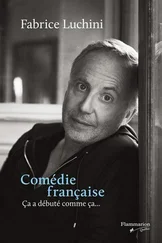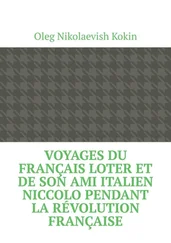Irène Némirovsky - Suite Française
Здесь есть возможность читать онлайн «Irène Némirovsky - Suite Française» весь текст электронной книги совершенно бесплатно (целиком полную версию без сокращений). В некоторых случаях можно слушать аудио, скачать через торрент в формате fb2 и присутствует краткое содержание. Жанр: Историческая проза, на английском языке. Описание произведения, (предисловие) а так же отзывы посетителей доступны на портале библиотеки ЛибКат.
- Название:Suite Française
- Автор:
- Жанр:
- Год:неизвестен
- ISBN:нет данных
- Рейтинг книги:4 / 5. Голосов: 1
-
Избранное:Добавить в избранное
- Отзывы:
-
Ваша оценка:
- 80
- 1
- 2
- 3
- 4
- 5
Suite Française: краткое содержание, описание и аннотация
Предлагаем к чтению аннотацию, описание, краткое содержание или предисловие (зависит от того, что написал сам автор книги «Suite Française»). Если вы не нашли необходимую информацию о книге — напишите в комментариях, мы постараемся отыскать её.
"A book of exceptional literary quality… it has the kind of intimacy found in the diary of Anne Frank."-The Times Literary Supplement
"Heroic… a novel about a nightmare in which the author is entirely embedded."-ANITA BROOKNER, The Spectator
"An exceptionally forceful and frank testimony… a real find. A masterpiece."-L'Express
"Remarkable as the story of the publication of Suite Française is, it will finally be of anecdotal interest compared with the importance of the book. Here is the work of a fine novelist at the top of her form, writing about the fate of her adopted country with a pitiless clarity."-Evening Standard
Suite Française — читать онлайн бесплатно полную книгу (весь текст) целиком
Ниже представлен текст книги, разбитый по страницам. Система сохранения места последней прочитанной страницы, позволяет с удобством читать онлайн бесплатно книгу «Suite Française», без необходимости каждый раз заново искать на чём Вы остановились. Поставьте закладку, и сможете в любой момент перейти на страницу, на которой закончили чтение.
Интервал:
Закладка:
"But it's not the same thing. What we're going through is down to people and people alone."
"It only seems like that, Jeanne. It all seems caused by this man or that, by one circumstance or another, but it's like in nature: after the calm comes the storm; it starts out slowly, reaches its peak, then it's over and other periods of calm, some longer, some shorter, come along. It's just been our bad luck to be born in a century full of storms, that's all. They'll die down."
"Yes," she said, although she didn't really follow this abstract argument, "but what about Corbin? Corbin's hardly a force of nature, is he?"
"He's a harmful specimen, like scorpions, snakes, poison mushrooms. Actually, we're a little bit to blame. We've always known what Corbin was like. Why did we carry on working for him? You wouldn't eat bad mushrooms and you have to be careful with bad people. There have been several times when we could have found other jobs, with a bit of courage and determination. And remember, when we were young I was offered that job as a teacher in Sao Paulo, but you didn't want me to go."
"All right, that's ancient history," she said, shrugging her shoulders.
"No, I just meant…"
"Yes, you just meant we shouldn't hold it against anyone. But you said yourself if you ran into Corbin you'd spit in his face."
They continued arguing, not because they hoped or even wished to win the other over, but because talking helped them forget their painful problems.
"Who could we speak to?" Jeanne finally exclaimed.
"You mean you still don't understand that nobody cares about anybody?"
She looked at him. "You're strange, Maurice. You've seen people at their most cynical, their most disillusioned, and at the same time you're not unhappy, I mean, not really unhappy inside! Am I wrong?"
"No."
"So what makes it all right, then?"
"My certainty that deep down I'm a free man," he said, after thinking for a moment. "It's a constant, precious possession, and whether I keep it or lose it is up to me and no one else. I desperately want the insanity we're living through to end. I desperately want what has begun to finish. In a word, I desperately want this tragedy to be over and for us to try to survive it, that's all. What's important is to live: Primum vivere. One day at a time. To survive, to wait, to hope."
She listened to him without saying a word. Suddenly, she got up and grabbed her hat from the mantelpiece. He looked at her in astonishment. "And what I say," she replied, "is 'Heaven helps those who help themselves.' Which is why I'm going to speak to Furières. He's always been nice to me and he'll help us, even if it's only to annoy Corbin."
Jeanne was right. Furières spoke to her and promised that she and her husband would each receive compensation totalling six months' salary, which brought their capital up to about sixty thousand francs.
"You see, I managed and heaven helped me," Jeanne said to her husband when she got home.
"And I did the hoping," he replied, smiling. "We were both right."
They were very happy with the outcome but sensed that now that their money worries were off their minds, at least for the immediate future, they would be completely overwhelmed by their anguish over their son.
29
It was autumn when Charlie Langelet returned home. The porcelain hadn't been damaged by the journey. He unpacked the large crates himself, trembling with joy when he felt, beneath the straw and tissue paper, the cool smoothness of a pink glass vase or a Sèvres statuette. He still couldn't believe he was really home, reunited with all his wonderful possessions. He would raise his eyes now and again to look through his windows (which still had their strips of coloured paper) at the delightful curve of the Seine.
At noon, the concierge came up to clean; he hadn't yet hired any servants. Important events-whether serious, happy or unfortunate-do not change a man's soul, they merely bring it into relief, just as a strong gust of wind reveals the true shape of a tree when it blows off all its leaves. Such events highlight what is hidden in the shadows; they nudge the spirit towards a place where it can flourish. Charlie had always been careful with money, a penny-pincher. When he got back after the exodus, he felt truly miserly. It gave him real pleasure to save money whenever possible and he was aware of this for, to top it all off, he had become cynical. Before, he would never have considered moving into a disorganised house full of dust; he would have recoiled at the idea of going to a restaurant the very day he returned. Now, however, he had been through so much that nothing frightened him. When the concierge told him that anyway she couldn't finish the cleaning today, that Monsieur didn't realise how much work there was to do, Charlie replied sweetly but firmly, "You'll manage somehow, Madame Logre. You'll just have to work a bit faster, that's all."
"Fast and good don't always go together, Monsieur!"
"This time they will. The good old days are over," Charlie said sternly, then added, "I'll be back at six o'clock. I trust that everything will be ready."
And after an imperious glance at the concierge, who was furious but said nothing, and a final loving look at his porcelains, he left. As he went down the stairs he calculated what he was saving: he wouldn't have to pay for Madame Logre's lunch any more; she could work for him two hours a day for a while; once the heavy work was done, it wouldn't take much to keep the apartment in order, and he could take his time to find some servants, a couple probably. Until now he had always had a couple, a valet and a cook.
He went and had lunch by the river, in a little restaurant he knew. He didn't find the food too bad, all things considered (he never ate much anyway), and the wine he drank was excellent. The owner whispered in his ear that there was still a bit of real coffee left. Charlie lit a cigar and felt that life was good. That is to say, no, not good as such, one mustn't forget the defeat of France and all the suffering, all the humiliation that resulted from it, but for him, Charlie, it was good because he took life as it came, without moaning about the past or fearing the future.
He flicked the ash from his cigar. His money was in America and since his funds were frozen, fortunately, he would have to pay less tax or perhaps even none at all. The franc would remain low for a long time. His fortune, as soon as he could get hold of it, would automatically be worth ten times what it was now. As for his day-to-day expenses, he'd made sure to put something aside a long time ago. It was forbidden to buy or sell gold, and it was already fetching outrageous prices on the black market. He thought with amazement of the wave of panic that had swept through him when he had wanted to leave France to go and live in Portugal or South America. Some of his friends had gone, but he was neither Jewish nor a Mason, thank God, he thought with a scornful smile. He had never been involved in politics and didn't see why he wouldn't be left alone, a poor man like him, very quiet, very harmless, who never hurt anybody and who loved nothing in this world but his porcelain collection. He thought, on a more serious note, that this was the secret of his happiness amid so much upheaval. He loved nothing, at least nothing that time could distort, that death could carry away; he'd been right not to have married, not to have had children… My God, everyone else had been taken in. He'd been the only clever one.
But coming back to that mad idea of emigrating: it had been born of a strange and almost insane belief that, in the space of a few days, the world was going to change into something horrific, a living hell. But look… Everything was the same! He thought of the Bible and the description of the world before the Flood. How did it go? Oh yes: people built houses, got married, ate and drank… Well, the Bible was incomplete. It should have said, "The Flood waters subsided and people began once more to build their houses, to marry, to eat and drink…" In fact, people weren't really very important. It was works of art, museums, collections that should be saved. What was terrible about the Spanish War was that artistic masterpieces had been left to be destroyed; but here the most important works had been saved, except for some of the châteaux near the Loire, of course. Now that was unforgivable. But the wine he'd drunk was so good, he felt inclined to be optimistic. After all, there were some very beautiful ruins. In Chinon, for example, what could be more admirable than the great hall with no roof and those walls-walls that had seen Joan of Arc pass, and where now birds nested and a wild cherry tree grew in a little corner.
Читать дальшеИнтервал:
Закладка:
Похожие книги на «Suite Française»
Представляем Вашему вниманию похожие книги на «Suite Française» списком для выбора. Мы отобрали схожую по названию и смыслу литературу в надежде предоставить читателям больше вариантов отыскать новые, интересные, ещё непрочитанные произведения.
Обсуждение, отзывы о книге «Suite Française» и просто собственные мнения читателей. Оставьте ваши комментарии, напишите, что Вы думаете о произведении, его смысле или главных героях. Укажите что конкретно понравилось, а что нет, и почему Вы так считаете.

![Константин Бальмонт - Константин Бальмонт и поэзия французского языка/Konstantin Balmont et la poésie de langue française [билингва ru-fr]](/books/60875/konstantin-balmont-konstantin-balmont-i-poeziya-francuzskogo-yazyka-konstantin-balmont-et-thumb.webp)










